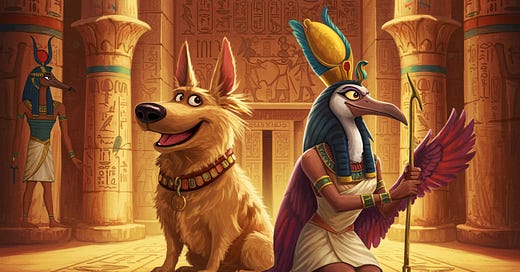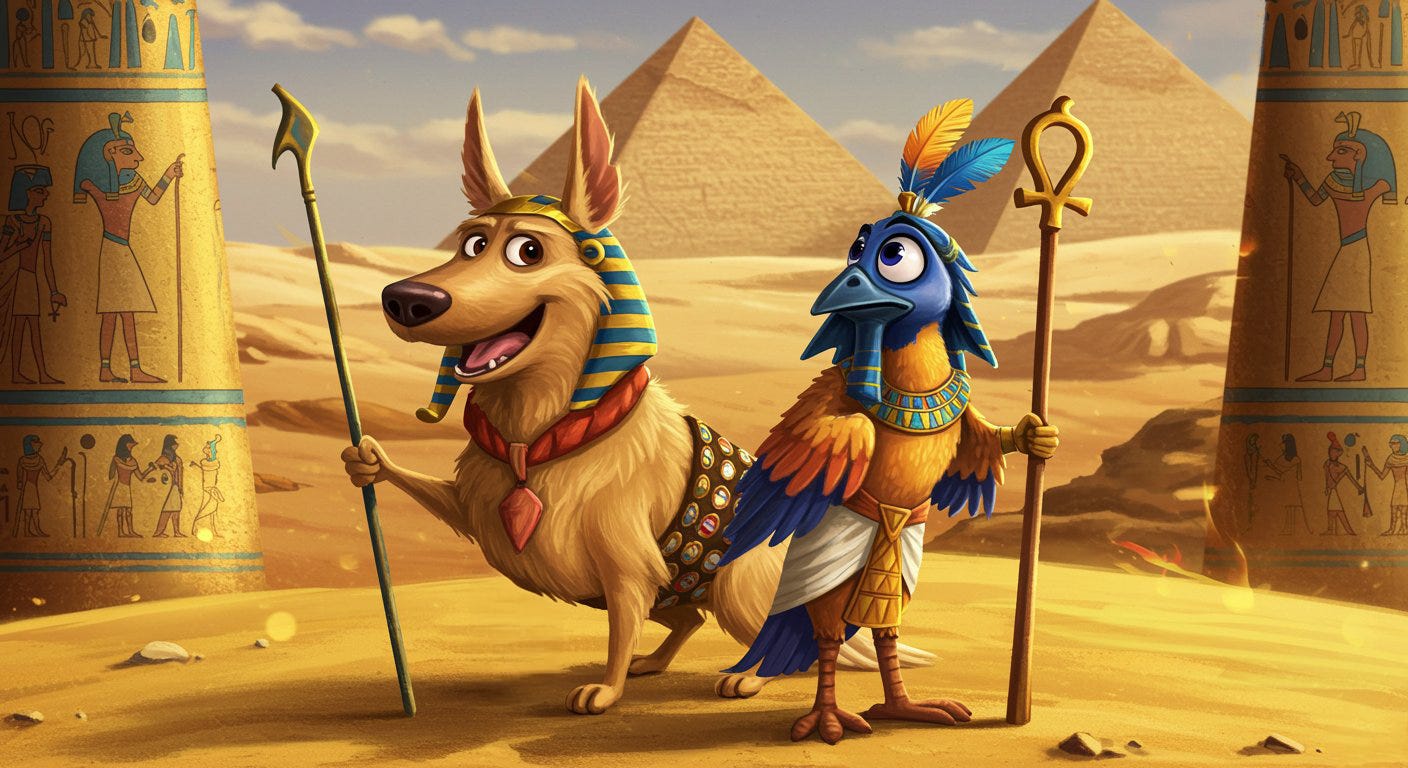If you’re like me, Pixar’s Up is one of those movies that never fails to resonate on an emotional level, no matter how many times you see it. It’s one of my absolute favorites, a story about an old widower chasing a dream in a house that flies by way of a million balloons, an awkward but sincere kid who is a “Wilderness Explorer” trying to earn his assisting the elderly badge, a talking dog, and a giant bird who loves chocolate. But here’s something wild: beneath its colorful animation, UP tells a story that feels like it’s been with us forever, tapping into ancient traditions about life, death, and what makes us worthy. Specifically, I’m talking about the Egyptian myth of the Weighing of the Heart, a belief about judging the soul after death. Today, I want to show you how UP mirrors this old tale, proving that the way we tell stories now is rooted in ideas baked into our collective culture for thousands of years. Let’s walk through the major beats of UP and see how Carl Fredricksen’s journey lines up with an Egyptian soul facing judgment. Ready? Let’s float into it!
The Egyptian Weighing of the Heart: A Quick Primer
Before we dive into UP, let’s set the stage with the Egyptian myth. Ancient Egyptians believed that when you die, your soul goes to the Hall of Two Truths for a big test. The god Anubis, who’s got a jackal head, puts your heart on a scale. On the other side is a feather from Ma’at, the goddess of truth and justice. The feather’s light, so your heart needs to be free of heavy stuff like guilt or bad deeds to balance it. If it does, you’re golden and head to the Field of Reeds, a paradise where you live forever. If your heart’s too heavy, a monster named Ammit eats it, and you’re gone for good. Another god, Thoth, with an ibis bird head, writes down the result. It’s all about whether you lived true to balance and goodness. Got it? Now, let’s see how UP plays out like Carl’s own heart-weighing, with balloons standing in for that feather.
Act 1: Carl’s Heavy Heart and the Call to Judgment
UP starts with Carl and Ellie Fredricksen, a couple dreaming of adventure. As kids, they idolize explorer Charles Muntz and plan to visit Paradise Falls, a jungle named so that it might hold more than a little bit of symbolism. They marry, prepare their childhood scrapbook for all the adventures they’re about to have together, and live happily, but life throws curve-balls. They can’t have kids, lose their savings, and never make it to the Falls. When Ellie dies, Carl’s left alone, clinging to their house like it’s her memory. Developers want him out, and after a scuffle, he’s ordered to a retirement home. That’s when he ties thousands of balloons to the house, lifts off, and heads for South America. Oh, and Russell, the young Wilderness Explorer, accidentally tags along.
This opening feels like Carl entering the Hall of Two Truths. His heart’s heavy with grief and regret for not taking Ellie to Paradise Falls. The house is like it being placed on the scale, stuffed with memories and guilt. The balloons? They’re our stand-in for Ma’at’s feather, trying to lift him toward something better, the paradise he seeks. In Egyptian terms, Carl’s death isn’t literal yet, but losing Ellie is the death of his old life, pushing him to face judgment. Will he stay weighed down, or find balance? Russell, like a guide, hints at Anubis, nudging Carl toward a test he doesn’t yet understand.
Act 2: Meeting the Guides and Facing the Scales
As Carl’s house floats, he’s grumpy about Russell but stuck with him. They crash-land in South America, dragging the house toward Paradise Falls. Along the way, they meet Dug, a talking dog, and Kevin, a rare, colorful bird. Dug’s loyal and loves Carl instantly, while Kevin’s a mom trying to get back to her chicks. It turns out, Kevin’s being hunted by none other than Charles Muntz, now a bitter old man obsessed with capturing her to clear his now tarnished reputation as a fraud. Carl is torn. Does he keep the house safe to honor Ellie, or help these new friends?
Here’s where the Egyptian vibe kicks in stronger. Dug and Kevin feel like Anubis and Thoth, the gods guiding the soul. Dug, a canine like jackal-headed Anubis, sticks by Carl, protecting him as he faces choices. Kevin, a bird like ibis-headed Thoth, doesn’t write anything down, but her presence challenges Carl to think beyond himself. The balloons keep the house aloft, but it’s a struggle, like a heart teetering on the scales. Muntz looms as a dark mirror, what Carl could become if he lets obsession weigh him down. In the myth, the soul’s past deeds are measured; for Carl, it’s his promise to Ellie versus the needs of Russell, Dug, and Kevin. The jungle’s his Hall of Two Truths, and the test is starting.
Act 3: The Heart Sinks and the Truth Revealed
Things get messy when Carl prioritizes the house over helping Kevin. Muntz’s dogs capture her, and Russell’s mad at Carl for abandoning their friend. Feeling guilty, Carl drags the house to a clearing, but it sinks to the ground, balloons now too diminished to lift it. He’s stuck, literally and emotionally. Then, sitting in the house, he opens Ellie’s scrapbook. He expects empty pages, proof he failed her dream. Instead, it’s filled with photos of their life together, ending with a note: “Thanks for the adventure. Now go have a new one!” Ellie’s saying their love was the real adventure, not Paradise Falls.
I’m getting a little chocked up just writing about it. Ahem.
This is the heart-weighing moment. Carl’s guilt is like a heavy heart tipping the scales toward Ammit. The sinking house shows he’s failing, too caught up in regret to rise. Ellie’s note is the truth that measures him. It says his life with her was enough, lightening his soul. In the myth, Thoth records the verdict; here, the scrapbook’s like Thoth’s scroll, showing Carl’s worth through love, not a destination. The balloons, still tied to the house, wait for him to prove he’s learned this truth. It’s a gut-punch scene, and it sets up his big choice.
Act 4: Lightening the Heart and Passing the Test
Carl springs into action. He throws out furniture, keepsakes, money, everything tying him to the past. The house gets lighter, and the balloons once again can lift him into the sky. Russell, meanwhile, has grabbed some balloons and a leaf blower to chase Muntz and save Kevin. Carl flies after him, joining the fight. In a wild airship battle, Carl, Russell, Dug, and Kevin team up. Muntz, chasing Kevin, gets tangled in stray balloons and falls to his death. Carl’s house takes a beating, and he lets it fall from the airship, watching it drift away.
This is Carl passing the Weighing of the Heart. Dumping the house’s contents is like purifying his soul, shedding guilt and fear. The balloons lift because his heart’s now light, matching Ellie’s truth. In the myth, a balanced heart earns paradise; Carl’s choice to save Kevin and Russell earns him a new purpose. Muntz’s fall is the flip side, like a heavy heart eaten by Ammit. Obsessed, paranoid, and cruel, willing to sacrifice anyone who gets in his way, he can’t rise, and the balloons don’t save him, sealing his doom. The house falling feels like Carl letting his old heart go, trusting he doesn’t need it to carry Ellie’s love. Russell, flying with his own balloons, is like a soul already light, guiding Carl to balance, while Dug and Kevin keep him grounded and focused.
Act 5: Paradise Found and the Afterlife Embraced
In the end, Carl’s house lands on the cliff at Paradise Falls, right where he and Ellie dreamed it would be. But Carl’s not living in it. He’s back home, mentoring Russell, hanging out with Dug, and embracing new adventures, like attending Russell’s scout ceremony. The house sits as a memory, not a weight, while Carl’s found a family and a future.
This is Carl’s Field of Reeds, the Egyptian afterlife where a worthy soul thrives. The house at Paradise Falls honors Ellie, like a heart balanced on the scales, but Carl’s real paradise is his life with Russell and Dug. In the myth, passing the test means eternal renewal; for Carl, it’s a new chapter, living Ellie’s spirit of adventure. The balloons, our feather, did their job, lifting him to judgment and letting him soar beyond it. Unlike the Egyptians’ divine verdict, Carl redeems himself, choosing lightness over burden.
Why This Matters: Stories Old and New
So, what’s the big deal? UP isn’t quoting Egyptian myths, and Carl’s no pharaoh. But the way it unfolds, with a man facing his past, shedding weight, and finding new life, feels like the Weighing of the Heart because humans have always wrestled with these questions: Am I good enough? What do I carry? What’s next? The balloons as Ma’at’s feather, the house as Carl’s heart, Dug and Kevin as guides like Anubis and Thoth, Muntz as a failed soul, all show how UP taps into a story as old as pyramids. Ellie’s scrapbook, revealing truth like Thoth’s record, and Russell, pushing Carl like a young Anubis, seal the deal.
Were these motifs intentional? I’ve never found any evidence to suggest that they were but for me, that just fortifies that these stories are ingrained in us.
Our culture’s full of these echoes. We tell stories to make sense of loss, guilt, and hope, just like the Egyptians did with their gods and scales. UP shows us it’s not about dusty myths, it’s about knowing that even if we’re not award of it in the moment our deeds will be judged justly and if our heart is true, if it’s “lite” we will be redeemed so that we can move forward to something better. Whether we weigh it against a feather, bunch of balloons, we’re all trying to lift something heavy and prove we’re worthy of what’s next. For me, that’s why UP is so special, it’s a reminder that even in a world of talking dogs and flying houses, we’re connected to stories that have shaped us for millennia.
What do you think? Next time you watch UP (and yeah, it’s my favorite movie, did I mention?), maybe picture Carl’s balloons glowing like Ma’at’s feather, weighing his heart for a new adventure. It’s a story that’s been true forever, and Pixar just gave it a fresh coat of paint.
Oh, and remember, “Adventure is out there.”






Very interesting. Thank you.